Winter has arrived, and whether you’ve adequately prepared your outdoor pool or not, you still need to provide proper care for your pool throughout the colder months of winter.
Winterizing your pool will prevent freezing, but continued winter care will ensure that your pool will be ready for use when the weather warms up again, without incurring unexpected costly repairs.
This article shares several winter pool care tips so that your pool can survive the harsh winter and be ready for use next summer.
Table of Contents
- Why Winter Pool Care Matters
- 8 Winter Care Tips for Your Outdoor Pool
Also see:
Why Winter Pool Care Matters
Winterizing your pool is vital to ensure it stays in good condition during the colder months. Proper pool care, including regular cleaning and balanced chemistry, will keep the water in your pool clean and clear. This helps to make swimming more enjoyable and reduces the risk of infection or illness.
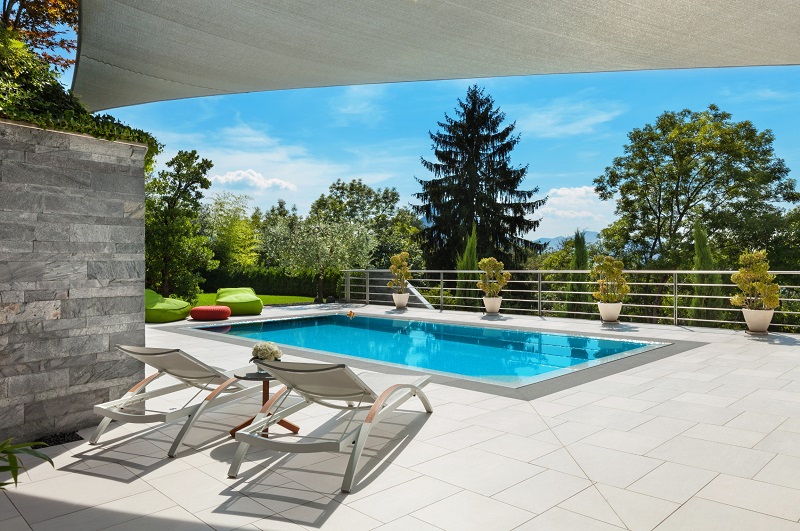
Proper pool care also helps to prevent damage to the pool itself. This includes damage to the pool liner, pump, filter, and other pool equipment. Additionally, a well-maintained pool can increase the value of your home. A poorly maintained pool or one in disrepair can decrease the value of your home or even end up being a “deal-breaker” for prospective homebuyers.
Finally, proper pool care can also save you money in the long run. You can prevent costly repairs down the road by taking care of problems as they arise.
Here are several reminders of why proper winter pool care matters:
- Will make your pool more enjoyable
- Can increase the value of your home if done properly
- Can decrease the value of your home if done improperly
- Will prevent costly damage
- Will reduce the risk of infection and illness
- Will extend the lifespan of key components of your pool, making on-going maintenance easier
- Will protect against unsightly stains
- Will prevent unexpected problems when opening up the pool for the summer
1. Keep your Pool Well-Covered
A pool cover helps to keep debris out of the pool and helps to retain heat. Be sure to secure the cover tightly to prevent it from blowing off. There are various kinds of pool covers, including solid covers, mesh covers, and bubble covers. Each type has its advantages and drawbacks. Be sure to choose a cover appropriate for your needs and budget.
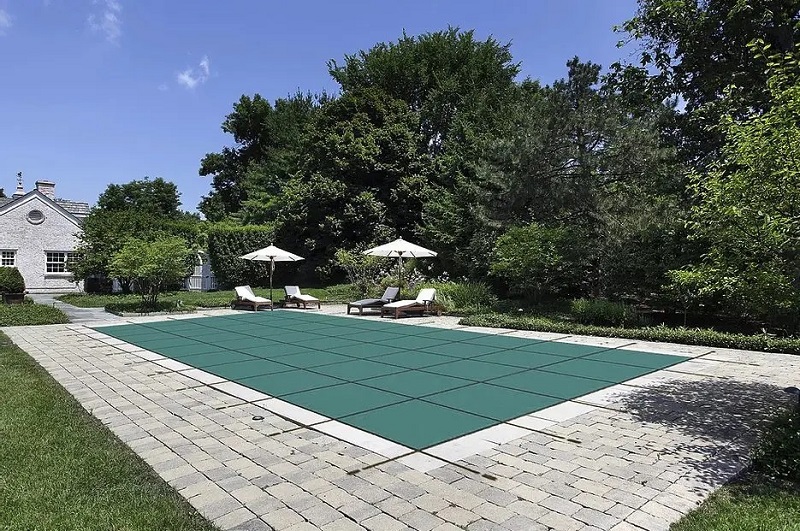
Image courtesy of SPQ Brands.
Throughout the winter, it’s a good idea to regularly inspect the cover for any rips, tears, or other damage, as well as areas that are letting debris or animals into water. Any damage or poor fitting should be repaired as soon as possible to prevent further deterioration.
Also use a cover pump to remove excess water that accumulates on the cover. This can help to prevent the cover from sagging or becoming too heavy, which can cause damage.
2. Add a Mid-Winter Algaecide
Algaecide is a chemical that helps to prevent and control algae growth in the pool. It is essential to use algaecide during the winter to keep algae from growing and spreading while the pool is not used as frequently. This is especially necessary if your local climate may occasionally exceed 60° F during winter months.
When adding your algaecide to your pool, it is important to run the pump for at least 24 hours to ensure the solution has been thoroughly integrated into the water. Also be sure to follow the manufacturer’s instructions for proper dosage and frequency of use.
By not adding a mid-winter algaecide and not periodically inspecting your pool, an unpleasant surprise of green algae may await you in the spring when you uncover your pool.
3. Prevent the Pool System from Freezing
To winterize the pump, filter and heater, drain all the water from the equipment and pipes, and then add RV antifreeze to the return lines to prevent freezing. RV antifreeze is recommended, as it is non-toxic and designed for use in plumbing systems, unlike automotive antifreeze. Removing excess water is critical to prevent pipes from freezing, and then expanding, which can cause your pipes to crack.
Water in pipes can either be blown out with a pool blower or air compressor, or can be vacuumed out with a Shop Vac.
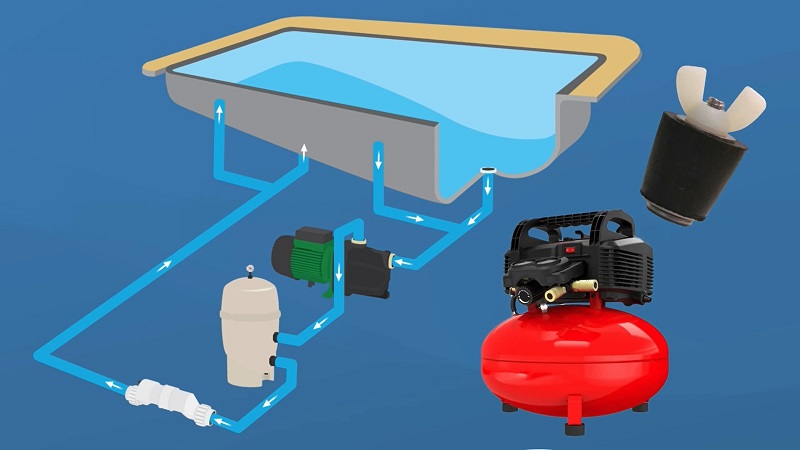
Image courtesy of Swim University.
4. Keep your Pool’s Chemicals Balanced
Regularly check the chemical levels in your pool during winter to ensure they are balanced. This includes the pH, total alkalinity, and chlorine levels. You will need to add chlorine, pH up, and pH down to adjust the chemical levels. Following the manufacturer’s instructions for adding chemicals is essential, as adding too much of a chemical can cause problems.
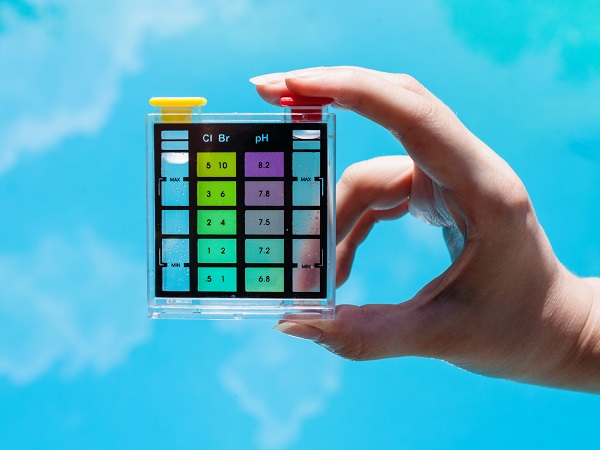
The correct chemical balance will protect the surface of the pool from staining and etching.
It is also a good idea to hire a professional pool service to test and adjust the chemicals in your pool if you are unsure how to do it yourself. This will ensure that your pool’s chemical levels are properly balanced and safe for swimming.
5. Don’t let Algae Grow
Algae can be a nuisance in swimming pools and challenging to get rid of once it grows. Proper filtration can help remove algae from the water, as well as other contaminants. Make sure to backwash the filter regularly and keep it in good condition.
Meanwhile, shocking the pool involves adding a large amount of chlorine or other sanitizers to the water to kill off any algae and bacteria that may be present. This is especially important during the winter when the water is not being circulated as frequently.
6. Remove Accessories
Be sure to store your pool accessories and equipment in a covered dry place, out of the reach of damaging UV sunlight and chemicals. Also keep any metal parts away from chlorine, as chlorine can cause metal to rust.
7. Clean Both the Pool Water & the Cover
It’s essential to regularly clean the pool during the winter to remove any debris or leaves that may have accumulated on the cover or in the water. Use a skimmer or pool vacuum to remove any visible debris, and consider using a pool brush to scrub the walls and floor of the pool to remove any algae or dirt that may be present.
8. Don’t Forget These Winter Pool Maintenance Tasks
Overall, pool care is vital to ensure that your pool is a safe and enjoyable place to swim and to maintain the value of your investment. Caring for your pool during winter months will protect it from damage, making it a more cost-effective and enjoyable amenity. Given that homeowners spend significantly fewer hours in their backyards during cold months, it’s easy to forget about regularly checking on your outdoor pool.
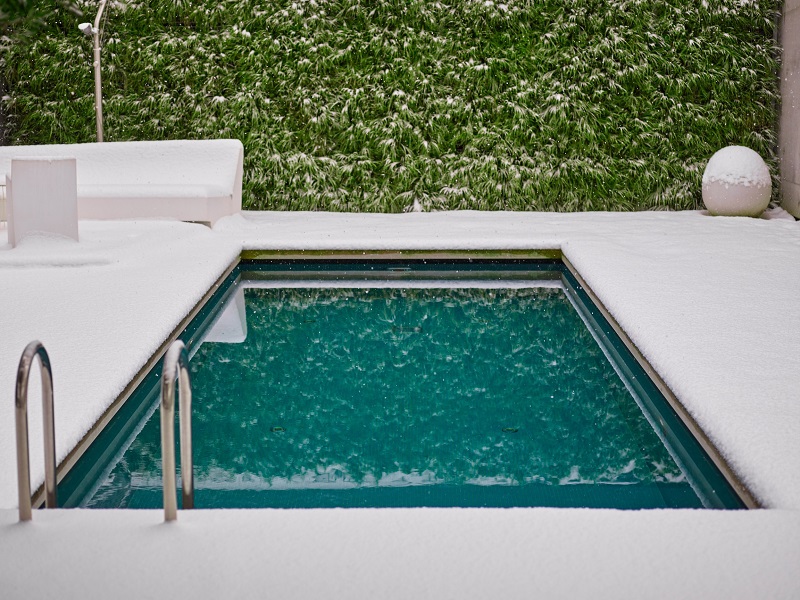
Here are several important winter pool maintenance tasks that are often neglected by homeowners:
- Drying the pool cover to prevent water from freezing on top
- Using a well-fitted cover to prevent debris and animals from entering
- Reducing the water level below the tiles, skimmers and returns
- Removing the cover and preparing for summer usage early, when the weather is still chilly
- Keeping the correct balance of chemicals throughout the winter months
- Checking and adhering to temperature limits of pool cleaning robots
- Checking your pool’s warranty to ensure that you do invalidate it with improper care
- Testing the water at least once a week for any chemical imbalances
- Checking for algae growth when the temperature goes above 60° F
- Monitoring the weather to take appropriate care afterward, such as heavy rain, winds, snow, freezing temperatures, and warm spells
- Checking the pool cover is securely attached throughout the winter
- Periodically removing debris from the cover
- Periodically checking underneath the cover for debris and algae growth
- Cleaning your pool before closing it for the winter
Even though your swimming pool may be closed for the season, taking a proactive approach to its care year-round will pay dividends in terms of value and enjoyment!
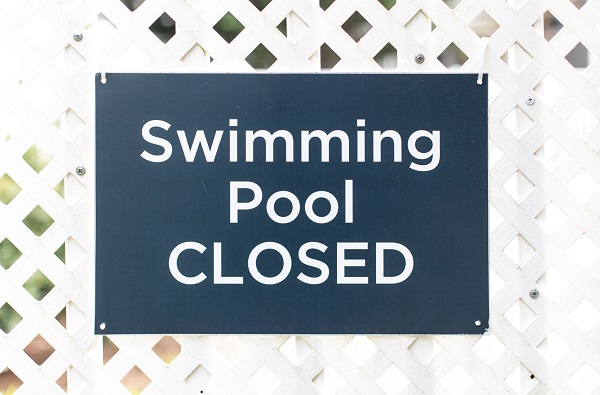
More Outdoor & Home Mainteance Articles
- 5 Things to Look for in the Fine Print of a Home Warranty Plan
- The 4 Critical Steps of Waterproofing a Balcony Deck
- 20 Best “How-To” YouTube Videos for Home Maintenance
- Pet Waste Removal: A Valuable Home Wellness Service for Homeowners
| Purgula is reader-supported. When you click on links to other sites from our website, we may earn affiliate commissions, at no cost to you. If you find our content to be helpful, this is an easy way for you to support our mission. Thanks! Learn more. |







